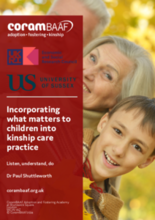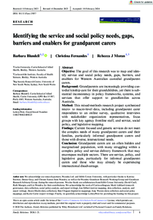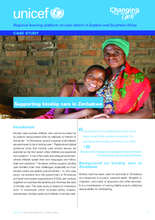Displaying 21 - 30 of 608
This study explores risk and resilience in UK school environments for students in kinship care. Eight professionals experienced in working with students in kinship care and their schools took part in individual, semi-structured interviews. Interviews focussed on kinship students’ needs and how professionals perceive schools respond to those needs.
This kinship care practice guidance was developed by listening to children's views. It is a practical guide to listening to children living in kinship families to help ensure that their voices and views are heard and acted upon. It is intended primarily for those who support children and families in kinship care arrangements, but it also applies to other areas of child welfare practice.
This paper highlights the experiences of birth mothers who have children placed in kinship care in the UK, focusing on some of the specific challenges they face. For many kinship families, these issues are also felt by the kinship carer. The paper sets out the need to do more to support kinship families - children, kinship carers and birth parents - to ensure children can thrive in safe, stable and loving homes.
The India Alternative Care Network hosted this webinar on kinship care in Africa on October 1, 2024.
This study highlights the absence of intimate parental care due to many sociopolitical circumstances in India, which creates a vacuum in fostering early childhood care. The objectives were to determine the dilemmas faced by care providers in the limited resources division between their own and their kin’s child and the invisible social stigma associated with the tag of orphans.
This paper aims to examine the social support network structures of youth in out-of-home care in the U.S. and to delineate the type of social support activities provided by kin and fictive kin within the networks.
The goal of this research was to map and identify service and social policy needs, gaps, barriers, and enablers for Western Australian custodial grandparent carers.
A comprehensive survey of kinship care policies identifies increasing efforts by states, the District of Columbia and Puerto Rico to promote kinship care and support kinship caregivers of children and youth who are known to the child welfare system.
The survey results presented in this report highlight increasing efforts by states, the District of Columbia and Puerto Rico to promote kinship care and support the caregivers of children who are known to the child welfare system. At the same time, the report calls on states to do more to help willing kin caregivers access and benefit from foster care licensing.
In this case study, the authors explore how the government of Zimbabwe and local civil society organisations (CSOs) are working together to maximise the benefits and minimise the risks of kinship care. The case study is based on interviews with 12 individuals which included policy makers, practitioners, kinship carers and children in kinship care.








